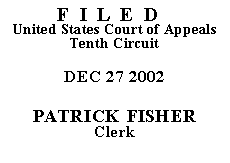

| DANIEL J. POST,
PlaintiffAppellant, |
|
| v. | |
| SUPREME COURT OF COLORADO; SUPREME COURT OF COLORADO, THE OFFICE OF ATTORNEY REGULATION COUNSEL; SUPREME COURT OF COLORADO, THE OFFICE OF THE PRESIDING DISCIPLINARY JUDGE; ROGER KEITHLEY, individually and in his office as presiding disciplinary judge of the Supreme Court of Colorado; EDWIN KAHN, individually and as a member of the panel of the office of the presiding disciplinary judge of the Supreme Court of Colorado; MARILYN DAVID, individually and as a member of the panel of the office of the presiding disciplinary judge of the Supreme Court of Colorado; GREG SAPAKOFF, individually and as a member of the office of attorney regulation counsel; and other unknown or unidentified persons, | (D.C. No. 01-M-1361) |
Daniel J. Post appeals the district court's dismissal with prejudice of his
civil action against the Supreme Court of Colorado and various other Colorado state offices and officials. For the reasons stated below, we affirm.
I. BACKGROUND
Mr. Post is a disbarred Colorado lawyer. In his amended complaint in the federal district court, he alleged that his disbarment by the Colorado Supreme Court was conducted in an unauthorized and illegal manner constituting theft of his license to practice law in violation of (1) his due process rights, (2) the Colorado Organized Crime Control Act, Colo. Rev. Stat. § 18-17-104, and (3) the Racketeer Influenced and Corrupt Organizations Act, 18 U.S.C. § 1961 ("RICO"). The district court granted the defendants' motion to dismiss for (1) lack of subject matter jurisdiction, (2) qualified immunity, (3) Eleventh Amendment immunity, (4) and failure to state a claim.
II. DISCUSSION
"We review a district court's dismissal for lack of subject matter
jurisdiction de novo." Aguilera v. Kirkpatrick, 241 F.3d 1286, 1292 (10th Cir. 2001). A district court "lacking jurisdiction cannot render judgment but must dismiss [when] it becomes apparent that jurisdiction is lacking." Tuck v. United Serv's Auto. Ass'n, 859 F.2d 842, 844 (10th Cir. 1988) (internal citations and quotations omitted). Therefore, if the district court lacked subject matter jurisdiction over Mr. Post's claims, we need go no further.
The district court did not have subject matter jurisdiction over the merits of
Mr. Post's disbarment. See Phelps v. Kansas Sup. Ct., 662 F.2d 649, 651 (10th Cir. 1981) ("The lower federal courts do not have subject matter jurisdiction to review state disbarment proceedings."). Further, we agree with the district court that because granting any of Mr. Post's desired relief would require the district court to determine the validity of the disbarment order, this case is therefore "not within the court's subject matter jurisdiction." Vol. rec. I, doc. 21, at 2, (Dist. Ct. Order, dated Apr. 2, 2002). See Doe v. Pringle, 550 F.2d 596, 599 (10th Cir. 1976) ("We concur in the district court's finding that it is without subject matter jurisdiction to review a final order of the Colorado Supreme Court denying a particular application for admission to the Colorado Bar. This rule applies even though, as here, the challenge is anchored to alleged deprivations of federally protected due process and equal protection rights."). Because we hold that the district court lacked subject matter jurisdiction over Mr. Post's claims, we will not evaluate the merits of his claims.
III. CONCLUSION
For the foregoing reasons, we AFFIRM the district court's dismissal of Mr. Post's action.
Entered for the Court,
Robert H. Henry
Judge
*.This order and judgment is not binding precedent, except under the doctrines of law of the case, res judicata, and collateral estoppel. The court generally disfavors the citation of orders and judgments; nevertheless, an order and judgment may be cited under the terms and conditions of 10th Cir. R. 36.3. After examining the appellant's brief and the appellate record, this panel has determined unanimously that oral argument would not materially assist the determination of this appeal. See Fed. R. App. P. 34(a)(2); 10th Cir. R. 34.1(G). The case is therefore ordered submitted without oral argument.